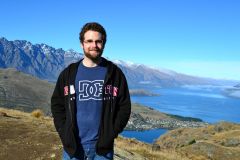Blake Porter chose a career path in science because he is deeply fascinated by how things work. His childhood was the classic story familiar to many scientists; he would take apart everything he could get his hands on to see how they worked and try to build his own versions, which, on more than one occasion, almost burned down the house, he now admits.
“My passion for finding out how things work led me to the brain, the ultimate black box of mystery. I had to know how it all worked.”
So, Blake went to Boston University and studied Neuroscience. While at BU he joined a Cognitive Neurobiology lab. There he discovered in vivo electrophysiology; a technique to eavesdrop on the activity and functionality of neurons in live behaving subjects.
“I had an exceptional undergraduate research experience with passionate post-doctoral researchers who nurtured my curiosity and encouraged me to do an honours research project. After graduating I continued working in the lab in collaboration with Dr Lara Rangel who has been a great inspiration to me. She challenged me to think deeply about the research questions I ask and to form detailed, multi-level hypotheses. I gained an invaluable cellular, local circuit, and network level understanding of the brain from working with her. But, as with Bilbo Baggins, I was ready for an adventure.”
Blake was not entirely sure of starting a PhD and was mainly looking for research jobs in New Zealand. He was elated to find Professor David Bilkey in the Department of Psychology at Otago was looking for a research technician for an in vivo electrophysiology project to uncover the neural mechanisms of self-control. Blake was aware of David's outstanding work in systems neuroscience investigating learning and memory and spatial processing.
“After many emails, a Skype meeting, and some soul searching, 'we' decided I was prepared enough to pursue a PhD at the University of Otago. Generous support obtained through a grant to David from the Marsden Fund of New Zealand helped to make it finally happen. The research questions I was looking to uncover fit well into the scope of David's learning, memory, and spatial processing expertise as well as that of Dr Kristin Hillman's (Blake's co-supervisor) work in how the brain encodes the value of choice options. So, after getting a student visa I was off to Middle Earth.”
Blake's work in Boston focused on how the hippocampus forms and organises episodic memories by associating experience elements with when and where they occur and how the executive, prefrontal regions of the brain utilise these memories to make context specific decisions. At Otago he's looking to continue this work but with more abstract elements of experience that may give a better insight into self-control at the neural circuit and network level. For example, what happens in our brains when we decide to put in the energy to exercise rather than sit and watch TV?
“I am particularly interested in how the brain uses memories to better inform these cost-benefit self-control decisions. For example, you may remember the last time you exercised you had more energy the next day and could focus in school more. These positive memories could help motivate you to exercise again in the future. Or, to put it in Hobbit terms; how did Bard's memories of Smaug's destruction of Dale motivate him to risk his life to save Lake-town?”
In order to understand how the brain remembers the costs and benefits of experiences and then uses those memories to make decisions, Blake applies his in vivo electrophysiology knowhow to record cellular and population level neural activity in the hippocampus and prefrontal cortex of rats as they perform effortful tasks.
“Currently I am focused on the cost-benefit memory aspect. I am investigating how energetically demanding experiences are represented and remembered by neural networks when different amounts of effort are expended to obtain a food reward. My rats run on a long track that can be tilted to different inclines to introduce varied amounts of effort. These memory experiments give us insight into how the brain represents and remembers the costs and benefits of different effortful experiences. We can then gain an understanding of how the brain uses these costbenefit memories to predict the value of future choices and guide decision making.”

Blake Porter
PhD Candidate